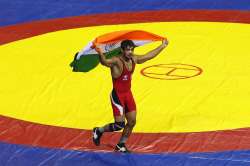Sushil Kumar's Phoenix-like rise exposes wrestling's sorry tale
Wrestling has accounted for medals at the Olympics since 2008 Beijing Games, but overall it has failed to live up to the hype it once created, and it was evident in 2017.

Indian wrestling would have remained a tale of highs and lows had it not been for two-time Olympic medallist Sushil Kumar's Phoenix-like rise, which gave a reality check to a sport that hasn't moved much since his sudden exit from the scene three years ago.
Wrestling has accounted for medals at the Olympics since 2008 Beijing Games, but overall it has failed to live up to the hype it once created, and it was evident in 2017.
Despite winning a number of medals, Indians were found wanting on many occasions with none coming close to the class of Sushil or Yogeshwar Dutt, and even Rio Olympics bronze medallist Sakshi Malik failed to up the glamour quotient with her inconsistent performances.
For a 34-year-old, making a comeback was a tough task, but Sushil hardly faced any such threat on the way to winning a gold at the Commonwealth Wrestling Championship.
He showed class is permanent, and that the youngsters still have a long way to go, at least in his weight category, men's 74kg freestyle.
Out of action since the 2014 Commonwealth Games in Glasgow, few anticipated Sushil's return to the sporting arena, especially given the circumstances that forced him into oblivion.
What started as a mere injury, which deterred him from taking part in the 2015 selection trials for World Championships that also posed as Rio Olympic qualifiers, went on take unexpected turns.
From getting a royal snub from the Wrestling Federation of India and Delhi High Court, which cost him a chance to participate in the Olympics last year, to allegations of spiking drinks of a fellow wrestler who qualified for the Rio Games in his weight division, the country's most decorated Olympian faced it all.
In addition, his administrative responsibilities and appointment as a national observer almost sealed his fate as an athlete, but his inclination to compete got the better of him and Sushil announced his decision to return to the mat at the National Championship last month in Indore.
He later also resigned as the national observer, making his intentions of continuing as a sportsperson clear.
His fairy-tale return, however, turned into an anti-climax with three of his opponents, out of five, conceding their bouts as "a mark of respect", handing him a gold medal on a platter and making it look like a farce.
His rivals might have done it out of reverence, but it certainly robbed Sushil a chance of staking his claim on the medal in a way that he deserved and wanted.
Although he did manage to give a glimpse of what he is still capable of in a couple of initial round bouts that he wrapped off in less than three minutes, before receiving the unexpected walkovers in quarters, semis and the final.
However, Sushil did not have to wait long before showing his mettle, as he bagged a gold on his own merit at the recently-concluded Commonwealth Wrestling Championships in Johannesburg.
Even though he faced just five rivals in his weight category, he defeated them all en route to his yellow metal.
One of them was compatriot Praveen Rana, who had incidentally given Sushil a walkover in the title clash at Indore. But the two battled out this time, and it was the veteran grappler, who came out on top with a 5-4 victory.
It gave Sushil what he craved for since the Nationals, but that certainly did not paint a very bright picture of Indian wrestling.
The fact that Rana has been India's top grappler in 74kg category after Sushil and Narsingh Yadav's exit from the scene, now proved that the sport in the country has not made a significant move.
Not just in 74kg, the Indians failed to make a mark at the World Championships in August across all three categories -- men, women and Greco-Roman. They returned empty-handed from the mega-event with none of them making it to even the medal rounds, despite the contingent boasting names like Sakshi and Asian champion Bajrang Punia.
This was a complete contrast to their dominating show at the Asian Championships in May, when hosts India had put up their best-ever performance by clinching 10 medals, including a gold in New Delhi.
But their failure to replicate it at the Paris World Championships in a space of a couple of months exposed many flaws and the need to bridge the gap at the highest level.
In the later part of the year, though, they made amends with Bajrang, Vinod Omprakash and Ritu Phogat returning with three silver medals for the first time from U-23 World Championships, held in Bydgoszcz, Poland.
At the recently-concluded Commonwealth Wrestling, India won medals across three categories, but that was not enough to authenticate their standing at the world stage, given the standard of competition there.
Nonetheless, Indian grapplers definitely showed potential and with the experienced Sushil back in action, they are certain to give a much better account of themselves at next year's Commonwealth and Asian Games.